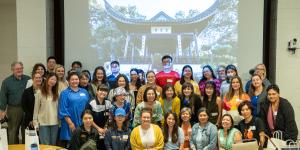On September 29, 2024, the USC U.S.-China Institute hosted a workshop at the Huntington’s Chinese garden, offering K-12 educators hands-on insights into using the garden as a teaching tool. With expert presentations, a guided tour, and new resources, the event explored how Chinese gardens' rich history and cultural significance can be integrated into classrooms. Interested in learning more? Click below for details on the workshop and upcoming programs for educators.
ICS Symposium: China and the Jews in the Modern Era
INTRODUCTION
While Jews never constituted more than a tiny fraction of a percent of the Chinese population, their presence in the country and relationship with Chinese culture have been significant. This relationship has occurred in a number of contexts.
When:
April 19, 2015 10:00am
Where

INTRODUCTION
While Jews never constituted more than a tiny fraction of a percent of the Chinese population, their presence in the country and relationship with Chinese culture have been significant. This relationship has occurred in a number of contexts.
There was a Chinese Jewish community in Kaifeng during the late Middle Ages whose remnants have remained until the present. Jews from Baghdad came to China in the late nineteenth and early twentieth centuries to trade in opium and other merchandise. Russian Jews came to Harbin and other Chinese communities to escape violence in Eastern Europe in the early twentieth century, and a large number of Jews came to live in Shanghai during World War Two, where they were saved from death at the hand of the Nazis.
More recently there has been a considerable interest in Jews and their culture in Chinese academia, where several specialists in Jewish studies now have faculty appointments. Finally, a highly disproportionate number of Jewish families—including a number in Central Ohio—adopt Chinese children, creating another context of relations between Jews and China.
This one-day symposium, featuring a distinguished international group of scholars, will explore aspects of the relationship between Jews and China in modernity. Invited speakers include: Dr. Noam Urbach (Bar-Ilan University, Israel), Dr. Moshe Bernstein (University of Western Australia, Australia), Dr. Jonathan Goldstein (University of West Georgia), and Dr. Bei Gao (University of North Carolina Wilmington). In addition, there will be a poster session for graduate students and recent Ph.D.'s to present their research.
ORGANIZERS:
Melton Center for Jewish Studies
Institute for Chinese Studies
SPECIAL THANKS:
Our special thanks for support from the Melton Center’s Thomas and Diann Mann Distinguished Symposium Fund, the Sino-Judaic Institute, and a U.S. Department of Education Title VI Grant to OSU’s East Asian Studies Center.
CO-SPONSORS:
College of Arts and Sciences
East Asian Studies Center
Middle East Studies Center
Center for the Study of Religion
Center for Languages, Literatures and Cultures
Department of History
Department of East Asian Languages and Literatures
Department of Near Eastern Languages and Cultures
Jewish Studies Student Association (JSSA)
Graduate Students of East Asian Languages and Literatures (GREALL)
Cost:
Free and Open to the Public
Event Website URL:
Featured Articles
February 7, 2024
Happy Lunar New Year from the USC US-China Institute!
Events
Thursday, March 21, 2024 - 4:00pm PST
Ying Zhu looks at new developments for Chinese and global streaming services.
Tuesday, March 19, 2024 - 4:00pm
David Zweig examines China's talent recruitment efforts, particularly towards those scientists and engineers who left China for further study. U.S. universities, labs and companies have long brought in talent from China. Are such people still welcome?






